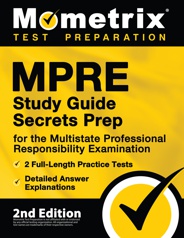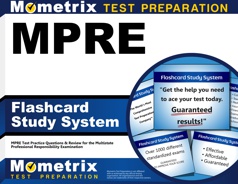The Multistate Professional Responsibility Exam (MPRE) is required by 48 of the 50 states as either a prerequisite to taking the bar exam or as a corequisite, meaning you can take it either before or after the bar, but have to take it at some point before you will be admitted as an attorney-at-law.
Click “Start Test” above to access free MPRE practice questions, and check out our premium-quality MPRE exam prep resources by clicking the links below!
MPRE Exam Outline
The MPRE exam contains 60 multiple-choice questions, 10 of which are unscored, and you will be given a time limit of 2 hours. The unscored questions are used by NCBE to validate questions for future versions of the MPRE exam.
The questions are grouped into 12 subject-matter categories.
I. Regulation of the legal profession (6%-12%)
- Restrictions on right to practice
- Regulation after admission—lawyer discipline
- Powers of courts and other bodies to regulate lawyers
- Admission to the profession
- Law firm and other forms of practice
- Responsibilities of partners, managers, and supervisory and subordinate lawyers
- Mandatory and permissive reporting of professional misconduct
- Unauthorized practice of law—by lawyers and nonlawyers
- Fee division with a nonlawyer
- Multijurisdictional practice
II. The client-lawyer relationship (10%–16%)
- Client-lawyer contracts
- Formation of client-lawyer relationship
- Counsel and assistance within the bounds of the law
- Termination of the client-lawyer relationship
- Scope, objective, and means of the representation
- Decision-making authority (actual and apparent)
- Communications with the client
- Fees
III. Client confidentiality (6%–12%)
- Attorney-client privilege
- Work-product doctrine
- Professional obligation of confidentiality—general rule
- Disclosures expressly or impliedly authorized by client
- Other exceptions to the confidentiality rule
IV. Conflicts of interest (12%–18%)
- Former judge, arbitrator, mediator, or other third-party neutral
- Current client conflicts—multiple clients and joint representation
- Acquiring an interest in litigation
- Business transactions with clients
- Third-party compensation and influence
- Current client conflicts—lawyer’s personal interest or duties
- Former client conflicts
- Prospective client conflicts
- Imputed conflicts
- Lawyers currently or formerly in government service
V. Competence, legal malpractice, and other civil liability (6%–12%)
- Maintaining competence
- Competence necessary to undertake representation
- Exercising diligence and care
- Civil liability to client, including malpractice
- Civil liability to nonclients
- Limiting liability for malpractice
- Malpractice insurance and risk prevention
VI. Litigation and other forms of advocacy (10%–16%)
- Expediting litigation
- Candor to the tribunal
- Meritorious claims and contentions
- Trial publicity
- Lawyer as witness
- Fairness to opposing party and counsel
- Impartiality and decorum of the tribunal
VII. Transactions and communications with persons other than clients (2%–8%)
- Communications with represented persons
- Respect for rights of third persons
- Truthfulness in statements to others
- Communications with unrepresented persons
VIII. Different roles of the lawyer (4%-10%)
- Lawyer as arbitrator, mediator, or other third-party neutral
- Prosecutors and other government lawyers
- Lawyer appearing in non-adjudicative proceeding
- Lawyer representing an entity or other organization
- Lawyer as advisor
- Lawyer as negotiator
- Lawyer as evaluator
IX. Safekeeping funds and other property (2%–8%)
- Establishing and maintaining client trust accounts
- Safekeeping funds and other property of clients
- Disputed claims
- Safekeeping funds and other property of third persons
X. Communications about legal services (4%–10%)
- Group legal services
- Referrals
- Advertising and other public communications about legal services
- Solicitation—direct contact with prospective clients
- Communications regarding fields of practice and specialization
XI. Lawyers’ duties to the public and the legal system (2%–4%)
- Criticism of judges and adjudicating officials
- Political contributions to obtain engagements or appointments
- Improper influence on government officials
- Voluntary pro bono service
- Accepting appointments
- Serving in legal services organizations
- Law reform activities affecting client interests
- Assisting judicial misconduct
XII. Judicial conduct (2%–8%)
- Maintaining the independence and impartiality of the judiciary
- Performing the duties of judicial office impartially, competently, and diligently
- Ex parte communications
- Disqualification
- Extrajudicial activities
Key Words and Phrases
As you prepare to take the MPRE exam, there are several words and phrases that appear on the exam that you should familiarize yourself with.
| Word/Phrase | Meaning |
|---|---|
| Attorney | This generally refers to the lawyer whose conduct is at issue, whereas “lawyer” is generally used in reference to a different lawyer. |
| Subject to discipline | “Discipline” in this phrase refers to the ABA Model Rules of Professional Conduct. |
| May Proper | These words are used to ask whether the conduct referred to in the question is professionally appropriate |
| Subject to litigation sanction | “Litigation sanction” in this phrase refers to any fine, contempt-related punishment, fee forfeiture, etc. that the conduct in the question might subject the attorney to. |
| Subject to disqualification | “Disqualification” in this phrase specifically refers to disqualification of the attorney as counsel in a criminal or civil matter. |
| Subject to civil liability | “Civil liability” in this phrase refers to such liability arising from claims of malpractice, breach of fiduciary duty, misrepresentation, etc. |
| Subject to criminal liability | “Criminal liability” in this phrase refers to such liability arising from destruction of evidence, obstruction of justice, prosecution for insurance or tax fraud, etc. |
| Disciplinary authority | This refers to the individual with the given authority to enforce the rules of professional conduct. |
| Lawyer-client relationship Client-lawyer relationship | These terms are used interchangeably. |
Check out Mometrix's MPRE Study Guide
Get practice questions, video tutorials, and detailed study lessons
Get Your Study Guide
MPRE Registration
To register for the MPRE exam, you must first create an NCBE account via their website. You will then be able to register through your account.
Once your registration is confirmed, you will receive an Authorization to Test, which will grant you the ability to schedule your examination appointment with Pearson VUE. The fee for your testing appointment is $160.
MPRE Dates
The exam is administered during three two-day periods each year. Below are the MPRE dates for 2024.
| Test Administration | Registration Deadline |
|---|---|
| March 26-27 | January 25 |
| August 13-14 | June 12 |
| November 7-8 | September 18 |
How to Study for the MPRE Exam
Think you aren’t a good test-taker? Maybe on a study-time crunch? Or just don’t know how to begin studying? Mometrix has designed a new Study Secrets course to help every student, no matter what study scenario you are in. Here’s what you’ll find in the Study Secrets Course:
- Techniques to Conquer Procrastination
- Steps to building a Study Plan custom to your learning style
- 7 Effective Note-Taking Methods
- Test-Taking Tips
- Memory Techniques and Mnemonics
- And much more!
Everyone learns differently, so we’ve tailored our Study Secrets Course to ensure every learner has what they need to prepare for their upcoming exam or semester. Click below to check it out!
Test Day
You should arrive at the Pearson VUE testing center about 30 minutes earlier than the scheduled exam time on test day. This will give you enough time to complete the check-in process.
When you arrive, you will be asked to sign in and present your photo ID to the proctor. You will be photographed and asked to sign a roster and other rule forms. Personal items such as your cell phone, wallet, keys, and accessories are not allowed in the testing room, so they should be left at home or placed in a secure locker outside the testing area.
Just before the exam starts, you will be given a brief tutorial on the testing system and will be asked to sign an NDA.
MPRE Scores
Your final MPRE score is determined using a scaled scoring system. This system takes your raw score, which is how many questions you answered correctly, and converts it to a numerical score from 50 to 150. The passing score requirements differ for each jurisdiction, ranging anywhere from 80 to 86.
MPRE results are generally made available via your NCBE account within five weeks of testing and will be reported to jurisdictions.
Retaking the MPRE Exam
If you do not pass the MPRE exam on your first try, you may retake it as many times as needed. You will need to complete the full registration process for each attempt, which includes paying the full testing fee.
Check out Mometrix's MPRE Flashcards
Get complex subjects broken down into easily understandable concepts
Get Your Flashcards
FAQs
Q
How many questions are on the MPRE exam?
A
There are 60 multiple-choice questions on the exam.
Q
How long is the MPRE exam?
A
The time limit for the exam is 2 hours.
Q
What is the passing score for the MPRE exam?
A
The minimum passing score requirements differ in each jurisdiction.
Q
How much does the MPRE exam cost?
A
The examination fee is $160.
